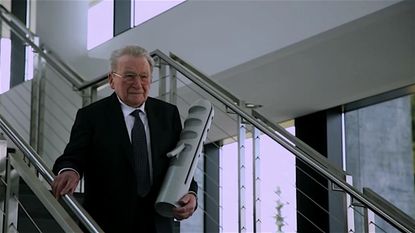Artur Fischer, inventor extraordinaire, is dead at 96


Artur Fischer, a German inventor trained as a locksmith, held more patents than Thomas Edison, and among his more than 1,100 patents are the wall anchor you have probably used to hang pictures and mirrors and the first synchronized camera flash. Fischer died Jan. 27 at his home in Waldachtal, Germany, The New York Times reported Monday. He was 96.
"What Bill Gates was to the personal computer, Artur Fischer is to do-it-yourself home repair," German magazine Der Spiegel said a year after Fischer won the prestigious European Inventor Award, a lifetime achievement prize from the European Patent Office. His first big breakthrough was the flash, purchased by the camera company Agfa, inspired by his inability to photograph his young daughter indoors — his insight was to synchronize an electric flash with the camera shutter. In 1958, he patented the expanding wall anchor, allowing people to hang heavy objects on plaster and drywall. Today, his company, the Fischer Group, produces more than 14 million of those anchors every day at factories around the world.
Fischer's last big commercial hit was the Fischertechnik kit, an electrical model set used by German kids and hobbyists alike to create machines and robots — he started off giving the kits as Christmas gifts to clients in 1964, then brought them to market when they proved a hit. You can learn more about Fischer, who tinkered until the end, in this short film from the European Patent Office. Peter Weber
Subscribe to The Week
Escape your echo chamber. Get the facts behind the news, plus analysis from multiple perspectives.

Sign up for The Week's Free Newsletters
From our morning news briefing to a weekly Good News Newsletter, get the best of The Week delivered directly to your inbox.
From our morning news briefing to a weekly Good News Newsletter, get the best of The Week delivered directly to your inbox.
Create an account with the same email registered to your subscription to unlock access.
Sign up for Today's Best Articles in your inbox
A free daily email with the biggest news stories of the day – and the best features from TheWeek.com
Peter has worked as a news and culture writer and editor at The Week since the site's launch in 2008. He covers politics, world affairs, religion and cultural currents. His journalism career began as a copy editor at a financial newswire and has included editorial positions at The New York Times Magazine, Facts on File, and Oregon State University.
-
 'Make legal immigration a more plausible option'
'Make legal immigration a more plausible option'Instant Opinion Opinion, comment and editorials of the day
By Harold Maass, The Week US Published
-
 LA-to-Las Vegas high-speed rail line breaks ground
LA-to-Las Vegas high-speed rail line breaks groundSpeed Read The railway will be ready as soon as 2028
By Peter Weber, The Week US Published
-
 Israel's military intelligence chief resigns
Israel's military intelligence chief resignsSpeed Read Maj. Gen. Aharon Haliva is the first leader to quit for failing to prevent the Hamas attack in October
By Justin Klawans, The Week US Published
-
 Empty-nest boomers aren't selling their big homes
Empty-nest boomers aren't selling their big homesSpeed Read Most Americans 60 and older do not intend to move, according to a recent survey
By Peter Weber, The Week US Published
-
 Brazil accuses Musk of 'disinformation campaign'
Brazil accuses Musk of 'disinformation campaign'Speed Read A Brazilian Supreme Court judge has opened an inquiry into Elon Musk and X
By Rafi Schwartz, The Week US Published
-
 Disney board fends off Peltz infiltration bid
Disney board fends off Peltz infiltration bidSpeed Read Disney CEO Bob Iger has defeated activist investor Nelson Peltz in a contentious proxy battle
By Rafi Schwartz, The Week US Published
-
 Disney and DeSantis reach detente
Disney and DeSantis reach detenteSpeed Read The Florida governor and Disney settle a yearslong litigation over control of the tourism district
By Peter Weber, The Week US Published
-
 Visa and Mastercard agree to lower swipe fees
Visa and Mastercard agree to lower swipe feesSpeed Read The companies will cap the fees they charge businesses when customers use their credit cards
By Peter Weber, The Week US Published
-
 Reddit IPO values social media site at $6.4 billion
Reddit IPO values social media site at $6.4 billionSpeed Read The company makes its public debut on the New York Stock Exchange
By Peter Weber, The Week US Published
-
 Housing costs: the root of US economic malaise?
Housing costs: the root of US economic malaise?speed read Many voters are troubled by the housing affordability crisis
By Peter Weber, The Week US Published
-
 Feds cap credit card late fees at $8
Feds cap credit card late fees at $8speed read The Consumer Financial Protection Bureau finalized a rule to save households an estimated $10 billion a year
By Peter Weber, The Week US Published
